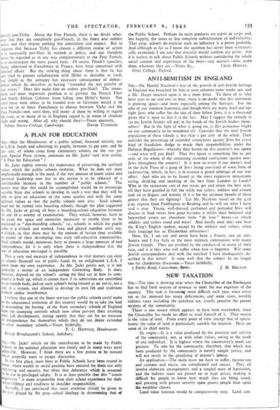A PLAN FOR EDUCATION SIR, —May the Headmaster of a public
school, financed entirely out of L.E.A. funds and admitting its pupils, between 7o per cent. and So per cent. of whom come from elementary schools, on the too per cent. Special Place system, comment on Mr. Jacks' very wise article, "A Plan for Education " ?
Mr. jacks rightly stresses the importance of preserving the spiritual values which the public schools enshrine. What he does not state emphatically enough is the need, if the vast amount of latent talent and potential leadership now lost to the nation is to be released, of a considerable increase in the number of " public schools." The easiest way that this could be accomplished would be to encourage suitable State day schools to develop in such a way that they will be able to give an education of the same quality and with the same spiritual values as that the public schools now give. Such schools need not be turned into boarding schools, though the plan suggested by Mr. Jacks of giving all boys a boarding-school education between 16 and -ill is worthy of examination. They would, however, have to be given the space and amenities necessary to enable them to be organised as " day-boarding schools," i.e., schools in which the pupils came at 9 o'clock end worked, lived and played together until, say, 6 o'clock, so that there may be the amount of leisure time available to permit of their developing into truly self-educative communities. Such schools would, moreover, have to possess a large measure of real independence, for it is only when there is independence that the sort of education envisaged is possible.
That a very real measure of independence in vital matters can exist in schools financed out of public funds by an enlightened L.E.A. I know from my own experience. As Mr. Jacks points out, it is not primarily a matter of an independent Governing Body. It does, however, depend on the school's laving the final say in how its com- munity is built up, which it cannot have if its admissions are controlled by an outside body, and on each school's being treated as an entity, not a unit in a system, and allowed to develop its own life and traditions without undue interference.
I believe that one of the finest services the public schools could make to the educational evolution of this country would be to take the lead in demanding the freeing of the State secondary schools of England from the cramping controls which now often prevent their attaining their full development, stating openly that they ask for no measure of independence for themselves which they do not desire extended to other secondary schools.—Yours faithfully,


























 Previous page
Previous page